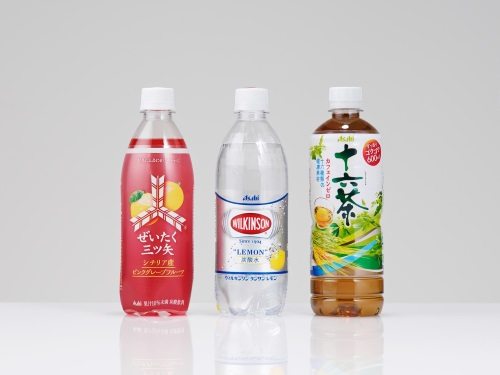Providing the best product quality while acting sustainably is the motto of the Asahi Group from Japan, coupled with KHS Corpoplast stretch blow molding equipment and the new AirbackPlus development.
“We’ve been relying on KHS Corpoplast in our soft drinks segment since 2000 and have invested in 12 stretch blow molders to date,” says Tatsuya Inoue, corporate officer and GM of the technology department at Asahi Soft Drinks.
“Ten of them are in operation and we only recently had five of these retrofitted with the newly developed AirbackPlus system.”
“As predicted by KHS Corpoplast, through this investment we’re profiting from savings in compressed air of up to 40%. This allows us to again be extremely sustainable and also greatly cuts our overheads,” he says.
Market share in Japan, Asia
The Asahi Group currently holds a market share of approximately 40% for beer and 15% for soft drinks in Japan.
It is also active on a national and international scale in the food sector and various other areas of business, such as logistics and restaurant management.
The group realizes an annual total turnover of 1.7 trillion yen (US$15.7 billion).
With a share of approximately 55% of total sales alcoholic beverages are the group’s mainstay, followed by soft drinks that account for just below 30%.
The star alcoholic beverage products are beer brands Asahi Super Dry, Japan’s market leader in the beer segment, and Clear Asahi.
Wonda coffee, blended tea Juroku-cha, Mitsuya Cider, and Calpis are at the top of Asahi’s soft drinks range.
Alcoholic beverages primarily reach the consumer in the glass bottle and can, with the polyethylene terephthalate (PET) bottle the most popular container in the soft drinks segment at 60%.
AirbackPlus
Even before the introduction of AirbackPlus, KHS Corpoplast gained position regarding the consumption of compressed air in the stretch blow molding process.
Compared to the previous generation the InnoPET Blomax Series IV has cut the amount of compressed air used by a targeted redesign of the valve block, among other factors.
Depending on the bottle volume, up to 35% of compressed air is saved as opposed to Series III.
AirbackPlus is always used in conjunction with the established Airback I process.
With Airback I the exact quantity of compressed air required to pre-blow a bottle is extracted from a container just produced and fed into a buffer located at the center of the blowing wheel.
From here it passes directly to the next preform.
This method achieves compressed air savings of approximately 10%.
The pre-blowing process is followed by the high pressure phase where the AirbackPlus process comes into play.
Here, more compressed air which is still usable is collected from the freshly produced bottle and fed to the pre-blown container at increased pressure (intermediate pressure stage). This cuts the amount of compressed air used by a further 30%.
Each of the 10 new blow molders produces up to 60,000 PET bottles an hour.
If Asahi retrofitted all these blow molders with this new development, and KHS estimates a compressed air saving of up to 40%, this means Asahi uses around 600 cubic meters less of compressed air per machine and hour.
Assuming that 0.2 kWh of energy are required for one cubic meter of air, 120 kWh can be saved per hour.
If Asahi has an average of 5,000 production hours per annum, the reduction per machine is about 600,000 kWh, which means 6,000,000 kWh for 10 machines.
At €0.10 (SU$0.11) per kilowatt hour, that is an annual cost saving of €600,000 – Asahi will have a return on investment in just less than 15 months.










